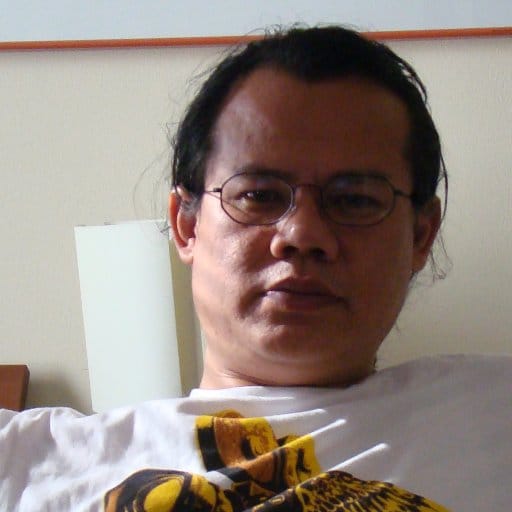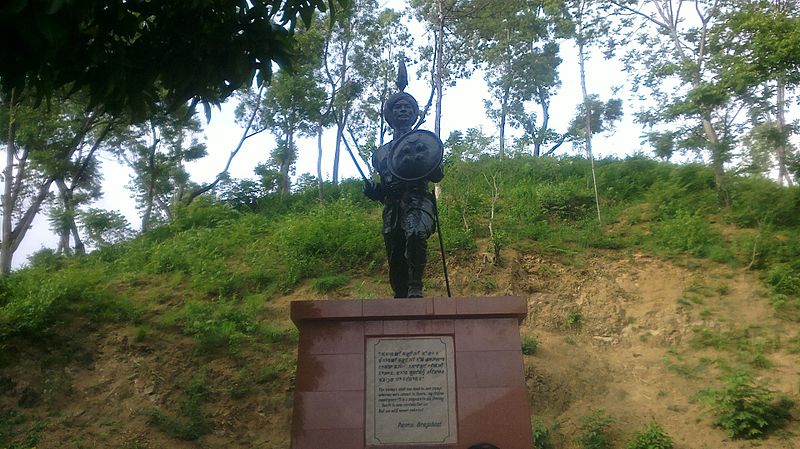“Despite giving a spirit opposition and fighting valiantly, there was no one left standing except Poana Brajabashi, a Manipuri British Army Officer who asked him to switch sides and join the British army
 Sunzu Bachaspatimayum
Sunzu Bachaspatimayum

Any discourse on patriotism and patriots in Manipur would almost always bring up Paona Brajabashi – the national hero of Manipur who gave his life for honour and valour. He was the commander who led the Manipuri Army against the British columns coming from Myanmar in the last Anglo-Manipuri War of 1891. Paona embarrassed death rather than retreat or surrender.
Although they were no match for the British columns in terms of numbers and firepower, the 300 strong warriors under the command of Paona Brajabashi fought gallantly until their last at the battle of Khongjom, some 35 km away from the capital Imphal. Their courage and heroism drew admiration even from the enemy. Kachingtabam Hemchandra, a Thang-Ta exponent illustrates this with a myth.
“Despite giving a spirit opposition and fighting valiantly, there was no one left standing except Poana Brajabashi, a Manipuri British Army Officer who asked him to switch sides and join the British army. But Paona refused. Impressed by his martial arts skills and valour, the British insisted that he switch change luring him with a plump post.
Paona replied, ‘Death is more welcome than treason.’ Saying this Paona took off his protective, magical cloth wrapped around his head gear and asked the British Officer to behead him.” This was the honour and valour that immortalized Paona even to this day.
Manipur had enjoyed sovereign status until its occupation by the British after the 1891 Khongjom War. Subsequently, the British imperialists established a strong foothold in Manipur.
Internal crises and the seven years of its devastation from 1819 to 1826 at the hands of Burma, compelled the Manipur rulers to seek of British’s help in regaining their Kingdom. As an ally of Prince Gambhir Singh, the British helped in chasing away the Burmese in the first Anglo-Burmese War (1824 – 1826). Manipur’s sovereignty was thus restored and Gambhir Singh was made the titular King.
The 1891 Anglo-Manipuri War, also remembered as the Last War of Independence was a fall-out of the disunity among the Manipuri Princes after the death of Maharaja Chandrakriti and pervasive and unbearable inference that the British made in the affairs of the Kingdom, particularly during the reign of Maharaj Surchandra Singh.
Despite being cornered by the British who attacked the Manipuris from three sides – Silchar, Kohima and Tamu (Myanmar) – spirited resistance displayed by the Manipuris has become a legend of patriotism and valour. Manipuri soldiers led by Major Paona Brajabashi who had to be called back for duty from retirement, faced the enemy columns who had the tactical advantage of 20-pounder mountain guns.
To fight off the advancing enemy, Paona needed canons and sent a messenger requesting them. Despite three repeated requests, the guns would never come. Paona and his men realized the futility of their efforts but rather than retreat, they chose to resist the British advance.
“Fellow citizen and countrymen, the enemy shell can land in our camp, whereas ours cannot theirs. The field guns have not arrived too. It is a disgrace to die fleeing. Death is now certain for us. But we shall never retreat.” With this famous war cry, Paona charged the enemy with two swords in both his hands and engaged in hand-to-hand combat. Surrounded by British soldiers, Paona fell on the battlefield. Thus Manipur lost its independence at the battle of Khongjom.
In the gallantry recommendation of FM Rundall, Captain 4th Gurkha Regiments, Commander Affairs of Sapam, Khongjom, dated the 29th April 1891, it is written:- ‘In conclusion, I would like to say that many of the old soldiers who have seen much fighting in previous campaigns tell me that they have never wither seen or taken part in a fight where such a determined and stubborn resistance was shown.’
Paona Brajabadhi was born to Paonam Tulsiram, Laipham Lakpa (Head of Laipham Panah) and Haobam Kunjeswari on December 20th 1823 during the period of political upheaval. He was called Paonam Naol Singh before acquiring the title ‘Paona Brajabashi’.
At the tender age of 7, Paonam Naol was initiated into Manipuri martial art traditions under the expertise of Major Loma Singh Longjamba, a renowned figure in martial art and warfare techniques. Impressed with his mastery, his mentor trained him in all the secret warfare he had acquired in his long military career.
He also learned martial sports like riding, fencing, freehand combat and other secret warfare from his maternal uncle, Major Athouba Haobam Binod who adopted him after the death of his father in 1850.
Determined to gain more knowledge of martial arts, Naol stayed back at Vrindaban after performing his father’s rites of passage and studied the martial traditions of Upper India from prominent masters at Banaras. Upon his return to Manipur, Naol began his military career as a junior officer in the King’s army in 1856 at the age of 23.
For his valiant role in the expedition to quell down an uprising by the Akam tribe of Chin Hills, he was promoted and became to be known as Subedar Paona Brajabashi, a title given by Maharaj Chandrakriti who he saved during an ambush on the expedition. Paona Brajabashi also distinguished himself at many other expeditions including the one against the Angamis in 1879 undertaken at the request of the British.
At the peak of his military career in 1886, Paona Brajabashi chose to retire from the royal army. The growing interference by the British in the administration of the state had angered Paona Brajabashi. He could not imagine himself becoming subservient to the British as he had seen enough of the British administration and their attitude towards the colonial states in India during his 7 years stay in UP.
Despite being on retirement, he was promoted to a Major (of canons) and his service was utilised during the crucial battle of Khongjom where he laid his life for the motherland.
Thus Manipur, a tiny kingdom, fought with the mighty empire on whom the ‘sun never sets’ and lost her independence. The sacrifice of Paona Brajabashi and other heroes should not go in vain. Freedom should not be bartered away or compromised at any cost under any circumstance.
Freedom from the British was attained after a prolonged struggle in which thousands of freedom fighters sacrificed their lives. The government of Manipur commemorates the Last War of Independence as Khongjom Day, every year on the day Paona Brajabashi was martyred on the battlefield on 23rd April.


